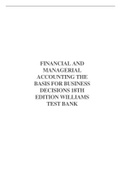Exam (elaborations)
FINANCIAL AND MANAGERIAL ACCOUNTING THE BASIS FOR BUSINESS DECISIONS 18TH EDITION
- Course
- Institution
- Book
FINANCIAL AND MANAGERIAL ACCOUNTING THE BASIS FOR BUSINESS DECISIONS 18TH EDITION Financial and Managerial Accounting: The Basis for Business Decisions continues to offer a solid foundation for students who are learning basic accounting concepts. Known for giving equal weight to financial and mana...
[Show more]




